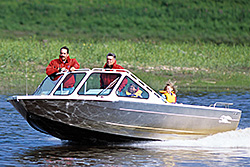Page Content
Power Boating

Canada’s coastlines, rivers and lakes offer recreational power boaters a multitude of opportunities for adventure on the water. From an afternoon on the water while at the cottage, a day out fishing, traveling your boat to new locations, or a multi-day cruising trip, Canadian waters are a world-class environment for power boating!
With any outdoor activity, there’s always an element of risk, and power boating is no exception. Commanding a vessel with inboard or outboard engines requires special care to avoid hazards such as fire, carbon monoxide, instability due to excessive speed, and collisions.
All operators of motorized pleasure craft used for recreational purposes must carry proof of competency on board, typically the Pleasure Craft Operator Card. As well,
- Persons under the age of 16 may not operate personal watercraft (PWC) under any circumstances;
- Persons under the age of 12 may not operate boats with motors over 10hp unless supervised by an adult; and
- Persons aged 12 to 16 may not operate boats with motors over 40hp unless supervised by an adult.
Operating power boats requires that you take precautions to avoid fire and carbon monoxide hazards. You are required by law to take precautions when fueling your boat, and some simple precautions can guard against carbon monoxide poisoning.
Rules of the Road
Understanding and obeying the rules of the road for power boats is critical due to the potential for high-speed collisions. As well, make sure you understand aids to navigation which are buoys and day beacons that govern passage through congested channels.
Before heading out in the water this summer:
- Take a safe boating course and make sure all your gear is in good shape.
- Check the weather forecast and be prepared for it to change.
- Know the waters you are sailing. If you don’t have a map, inquire about conditions or hazards, including rocks and strong currents.
- The water can be very cold and can render you hypothermic in minutes. Ensure you’re up-to-date on your lifesaving skills.
- Wear your life jacket or PFD. About 90% of people who drown in recreational boating incidents are not wearing a flotation device. It’s the best insurance you can have.
Cool Links
GENERAL
Office of Boating Safety
Recreational Boating Regulations
Cook-Rees Memorial Fund for Water Search and Safety
Weather Office
Canadian Coast Guard
Lifesaving Society - WaterWise Boat Safety Team
Canadian Power and Sail Squadrons
Boating Safety Paddle Canada
BRITISH COLUMBIA
Boating in BC
Lifesaving Society - BC & Yukon
Guide to boating in BC
ALBERTA
Boating Alberta
Lifesaving Society - Alberta Branch
SASKATCHEWAN
Boat Operator Accredited Training
Boating in Saskatchewan
Saskatchewan Squadron (Chapter) of the Canadian Power & Sail Squadrons
MANITOBA
Water Safety
Boating regulations
Lifesaving Society - Manitoba Branch
NWT
Boat Safety
Life Jacket
Lifesaving Society - NWT Branch
YUKON
Lifesaving Society - BC & Yukon
Yukon Power and Sail Squadron
River Cruises & Boating in Yukon
ONTARIO
Ministry of Transportation/Boating
Boating Safety
Lifesaving Society - Ontario Branch
Ontario Marine Operators Association
Ontario Boating League
Boating Ontario
QUEBEC
Lifesaving Society - Quebec Branch
Association Maritime du Québec
Navigation Quebec
NEW BRUNSWICK
Lifesaving Society - NB Branch
Boating and Marinas NB
NOVA SCOTIA
Lifesaving Society - NS Branch


